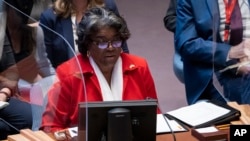The United States is seeking international condemnation at the United Nations Security Council of North Korea’s latest intercontinental ballistic missile test.
“We will offer another opportunity for the council to hold the DPRK accountable for its dangerous rhetoric and its destabilizing actions,” U.S. Ambassador Linda Thomas-Greenfield said at a meeting called by the U.S. on Monday. “The United States will be proposing a presidential statement to this end.
A presidential statement of the 15-nation U.N. Security Council is one step below a resolution and requires consensus of all members.
Thomas-Greenfield underscored that Friday’s test was Pyongyang’s eighth ICBM launch this year and part of a record 63 ballistic missile launches in 2022 – more than double its previous annual record of 25.
“Sixty-three times this year the DPRK has flagrantly violated Security Council resolutions and attempted to undermine the global nonproliferation regime,” she said.
The latest ICBM — the second this month — flew an estimated 1,000 kilometers and impacted within Japan’s exclusive economic zone off its northern territory, just 200 kilometers from Hokkaido.
Japan’s ambassador said calculations based on flight trajectory indicate the estimated capable range of the missile could exceed 15,000 kilometers.
“In that case, all of Asia, all of Europe, all of North America -- including New York -- all of Africa, and even part of South America, could be within range of this delivery system of unlawful nuclear warheads,” Ambassador Ishikane Kimihiro told the council, adding it is “outrageous” to allow North Korea to take the entire international community hostage.
Friday’s launch was widely condemned, including by U.N. Secretary-General Antonio Guterres, who called on North Korea to halt any provocative acts.
North Korean Foreign Minister Choe Son Hui said in a statement carried by state media on Monday that the country’s missile tests are part of its legitimate right to self-defense and accused the U.N. chief of being a “puppet” of the United States.
Pyongyang has said its tests are in response to U.S. and South Korean military drills.
South Korea’s ambassador said the longtime military exercises could never be an excuse for Pyongyang’s illicit nuclear and ballistic missile development.
“We have witnessed how the DPRK is fully taking advantage of this council’s inaction and divisions to build up its nuclear arsenal,” Ambassador Joonkook Hwang said.
“Since the Security Council failed to adopt a resolution because of the opposition of two permanent members in May, the DPRK has launched 40 ballistic missiles and promulgated its new law on nuclear weapons policy, which set the threshold for using nuclear weapons far lower than any other country,” he added.
Despite condemnation from most Security Council members and growing concern about advances in North Korea’s illicit weapons programs, it appeared by the end of Monday’s meeting that the two members that blocked the May resolution — China and Russia — would again obstruct council action.
China’s ambassador said Beijing is concerned about the spiral of rising tension and confrontation on the Korean Peninsula, which he said serves no party’s interests.
“The Security Council should play a constructive role on this issue and should not always condemn, always pressure on DPRK,” Ambassador Zhang Jun said. “Deliberations at the council should be to ease tensions, promote de-escalation of the situation at an early date, so as to leave room for diplomatic efforts, rather than create obstacles for this.”
Asked by VOA after the meeting if China would support the U.S. proposed statement, Ambassador Zhang said, “I don’t think so. I’ve made my statement. I think you have my answer.”
Russia also looked likely to block, as its envoy blamed Washington and its allies for stoking tensions with its military exercises and sanctions.
Possibly anticipating council disunity, the U.S. ambassador, flanked by the representatives of 13 countries, including Japan, South Korea, and several current and incoming Security Council members, read out a joint statement strongly condemning the ICBM launch.
“We invite all [U.N.] member states to join us in condemning the DPRK’s unlawful ballistic missile launches and call for full implementation of the existing Security Council resolutions,” Thomas-Greenfield read out. “We also urge the DPRK to abandon its unlawful weapons programs in a complete, verifiable, and irreversible manner.”
She reiterated their commitment to diplomacy to resolve tensions on the Korean Peninsula.






